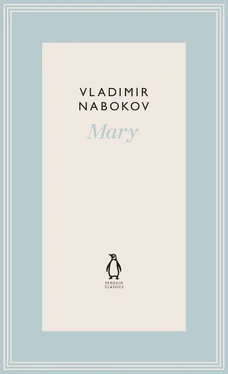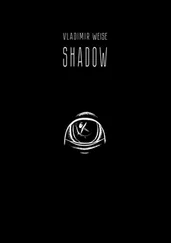Mary
a novel
by Vladimir Nabokov
Translated from the Russian
by Michael Glenny in collaboration with the Author
Having recalled intrigues of former years,
having recalled a former love.
— Pushkin
The Russian title of the present novel, Mashenka , a secondary diminutive of Maria , defies rational transliteration (the accent is on the first syllable with the “a” pronounced as in “ask” and a palatalized “n” as in “mignon”). In casting around for a suitable substitute (Mariette?, May?) I settled for Mary , which seemed to match best the neutral simplicity of the Russian title name.
Mashenka was my first novel. I started working on it in Berlin, soon after my marriage in the spring of 1925. It was finished by the beginning of the following year and published by an émigré book company (Slovo, Berlin, 1926). A German version, which I have not read, appeared a couple of years later (Ullstein, Berlin, 1928). Otherwise, it has remained untranslated for the impressive span of forty-five years.
The beginner’s well-known propensity for obtruding upon his own privacy, by introducing himself, or a vicar, into his first novel, owes less to the attraction of a ready theme than to the relief of getting rid of oneself, before going on to better things. It is one of the very few common rules I have accepted. Readers of my Speak, Memory (begun in the Nineteen Forties) cannot fail to notice certain similarities between my recollections and Ganin’s. His Mary is a twin sister of my Tamara, the ancestral avenues are there, the Oredezh flows through both books, and the actual photograph of the Rozhestveno house as it is today—beautifully reproduced on the cover of the Penguin edition ( Speak, Memory , 1969) could well be a picture of the pillared porch in the “Voskresensk” of the novel. I had not consulted Mashenka when writing Chapter Twelve of the autobiography a quarter of a century later; and now that I have, I am fascinated by the fact that despite the superimposed inventions (such as the fight with the village rowdy or the tryst in the anonymous town among the glowworms) a headier extract of personal reality is contained in the romantization than in the autobiographer’s scrupulously faithful account. At first I wondered how that could be, how the thrill and the perfume could have survived the exigency of the plot and the ostentation of fictional characters (two of them even appear, very awkwardly, in Mary’s letters), especially as I could not believe that a stylish imitation should be able to vie with plain truth. But the explanation is really quite simple: in terms of years, Ganin was three times closer to his past than I was to mine in Speak, Memory .
Because of the unusual remoteness of Russia, and because of nostalgia’s remaining throughout one’s life an insane companion, with whose heartrending oddities one is accustomed to put up in public, I feel no embarrassment in confessing to the sentimental stab of my attachment to my first book. Its flaws, the artifacts of innocence and inexperience, which any criticule could tabulate with jocose ease, are compensated for me (the sole judge in this case and court) by the presence of several scenes (convalescence, barn concert, boat ride) which, had I thought of it, should have been transported virtually intact into the later work. In those circumstances, I realized as soon as my collaboration with Mr. Glenny started that our translation should be as faithful to the text as I would have insisted on its being had that text not been mine. Revampments of the lighthearted and highhanded order that I used for the English version of, say, King, Queen, Knave could not be envisaged here. The only adjustments I deemed necessary are limited to brief utilitarian phrases in three or four passages alluding to routine Russian matters (obvious to fellow-émigrés but incomprehensible to foreign readers) and to the switch of seasonal dates in Ganin’s Julian Calendar to those of the Gregorian style in general use (e.g., his end of July is our second week of August, etc.).
I must close this preface with the following injunctions. As I said in reply to one of Allene Talmey’s questions in a Vogue interview (1970), “The best part of a writer’s biography is not the record of his adventures but the story of his style. Only in that light can one properly assess the relationship, if any, between my first heroine and my recent Ada.” I can as well say that there is none. The other remark concerns a bogus creed which is still being boosted in some quarters. Although an ass might argue that “orange” is the oneiric anagram of organe , I would not advise members of the Viennese delegation to lose precious time analyzing Klara’s dream at the end of Chapter Four in the present book.
VLADIMIR NABOKOV
January 9, 1970
‘Lev Glevo. Lev Glebovich? A name like that’s enough to twist your tongue off, my dear fellow.’
‘Yes, it is,’ Ganin agreed somewhat coldly, trying to make out the face of his interlocutor in the unexpected darkness. He was annoyed by the absurd situation in which they both found themselves and by this enforced conversation with a stranger.
‘I didn’t ask for your name and patronymic just out of idle curiosity, you know,’ the voice went on undismayed. ‘I think every name —’
‘Let me press the button again,’ Ganin interrupted him.
‘Do press it. I’m afraid it won’t do any good. As I was saying every name has its responsibilities. Lev and Gleb, now — that’s a rare combination, and very demanding. It means you’ve got to be terse, firm and rather eccentric. My name is a more modest one and my wife’s name is just plain Mary. By the way, let me introduce myself: Aleksey Ivanovich Alfyorov. Sorry, I think I trod on your foot —’
‘How do you do,’ said Ganin, feeling in the dark for the hand that poked at his cuff. ‘Do you think we are going to be stuck here for long? It’s time somebody did something. Hell.’
‘Let’s just sit down on the seat and wait,’ the tiresome, cheerful voice rang out again just above his ear. ‘Yesterday when I arrived we bumped into each other in the passage. Then in the evening, through the wall, I heard you clearing your throat and I knew at once from the sound of your cough that you were a fellow countryman. Tell me, have you been boarding here for long?’
‘Ages. Got a match?’
‘No. I don’t smoke. Grubby place, this pension — even though it is Russian. I’m a very lucky man, you know — my wife’s coming from Russia. Four years, that’s no joke. Yes, sir. Not long now. It’s Sunday today.’
‘Damned darkness,’ muttered Ganin, and cracked his fingers. ‘I wonder what time it is.’
Alfyorov sighed noisily, giving off the warm, stale smell of an elderly man not in the best of health. There is something sad about that smell.
‘Only six more days now. I assume she’s coming on Saturday. I had a letter from her yesterday. She wrote the address in a very funny way. Pity it’s so dark, or I’d show it to you. What are you fumbling for, my dear fellow? Those little vents don’t open, you know.’
‘For two pins I’d smash them,’ said Ganin.
‘Come, come, Lev Glebovich. Wouldn’t it be better to play some party game? I know some splendid ones, I make them up myself. For instance: think of a two-figure number. Ready?’
‘Count me out,’ said Ganin, and thumped twice on the wall with his fist.
‘The porter’s been asleep for hours,’ droned Alfyorov’s voice, ‘so it’s no use banging like that.’
Читать дальше










